BTEC HND Unit 9 Entrepreneurship and Small Business Management Report
VerifiedAdded on 2020/10/22
|10
|2716
|142
Report
AI Summary
This report delves into the realm of entrepreneurship and small business management, exploring various types of entrepreneurial ventures and their relationship to entrepreneurial typologies. It examines the similarities and differences between different ventures, including small versus large businesses, scalable start-ups, and social enterprises. The report further analyzes the impact of micro and small businesses on the economy, highlighting their role in employment generation, economic growth, and the importance of these businesses in the UK's social economy. It also covers the characteristics, skills, motivational drivers, and traits of successful entrepreneurs, as well as aspects of entrepreneurial personality reflecting entrepreneurial mindset and motivation. Finally, the report analyzes how background and experience can either hinder or foster entrepreneurship, providing a comprehensive overview of the subject matter.

Entrepreneurship and
Small Business
Management
Small Business
Management
Paraphrase This Document
Need a fresh take? Get an instant paraphrase of this document with our AI Paraphraser
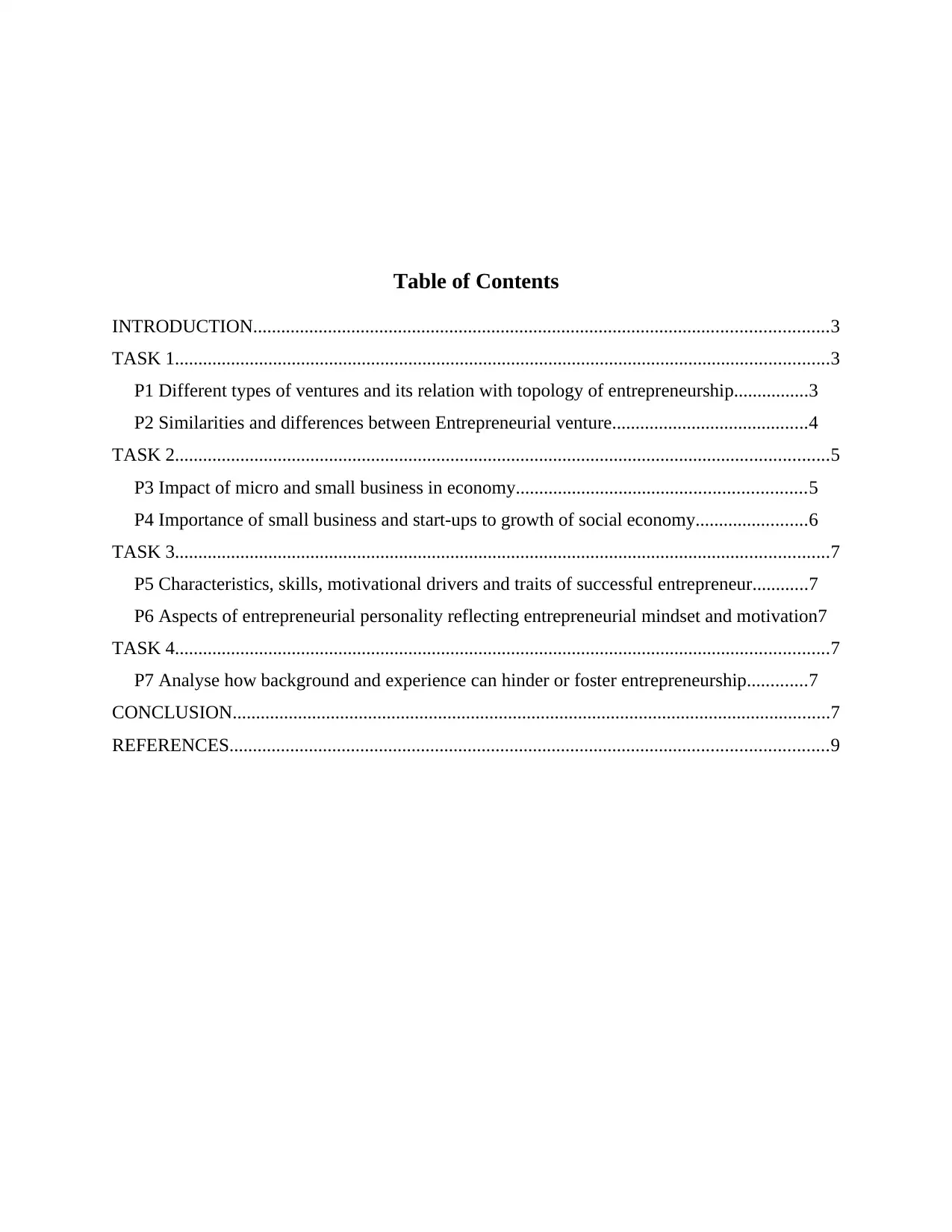
Table of Contents
INTRODUCTION...........................................................................................................................3
TASK 1............................................................................................................................................3
P1 Different types of ventures and its relation with topology of entrepreneurship................3
P2 Similarities and differences between Entrepreneurial venture..........................................4
TASK 2............................................................................................................................................5
P3 Impact of micro and small business in economy..............................................................5
P4 Importance of small business and start-ups to growth of social economy........................6
TASK 3............................................................................................................................................7
P5 Characteristics, skills, motivational drivers and traits of successful entrepreneur............7
P6 Aspects of entrepreneurial personality reflecting entrepreneurial mindset and motivation7
TASK 4............................................................................................................................................7
P7 Analyse how background and experience can hinder or foster entrepreneurship.............7
CONCLUSION................................................................................................................................7
REFERENCES................................................................................................................................9
INTRODUCTION...........................................................................................................................3
TASK 1............................................................................................................................................3
P1 Different types of ventures and its relation with topology of entrepreneurship................3
P2 Similarities and differences between Entrepreneurial venture..........................................4
TASK 2............................................................................................................................................5
P3 Impact of micro and small business in economy..............................................................5
P4 Importance of small business and start-ups to growth of social economy........................6
TASK 3............................................................................................................................................7
P5 Characteristics, skills, motivational drivers and traits of successful entrepreneur............7
P6 Aspects of entrepreneurial personality reflecting entrepreneurial mindset and motivation7
TASK 4............................................................................................................................................7
P7 Analyse how background and experience can hinder or foster entrepreneurship.............7
CONCLUSION................................................................................................................................7
REFERENCES................................................................................................................................9
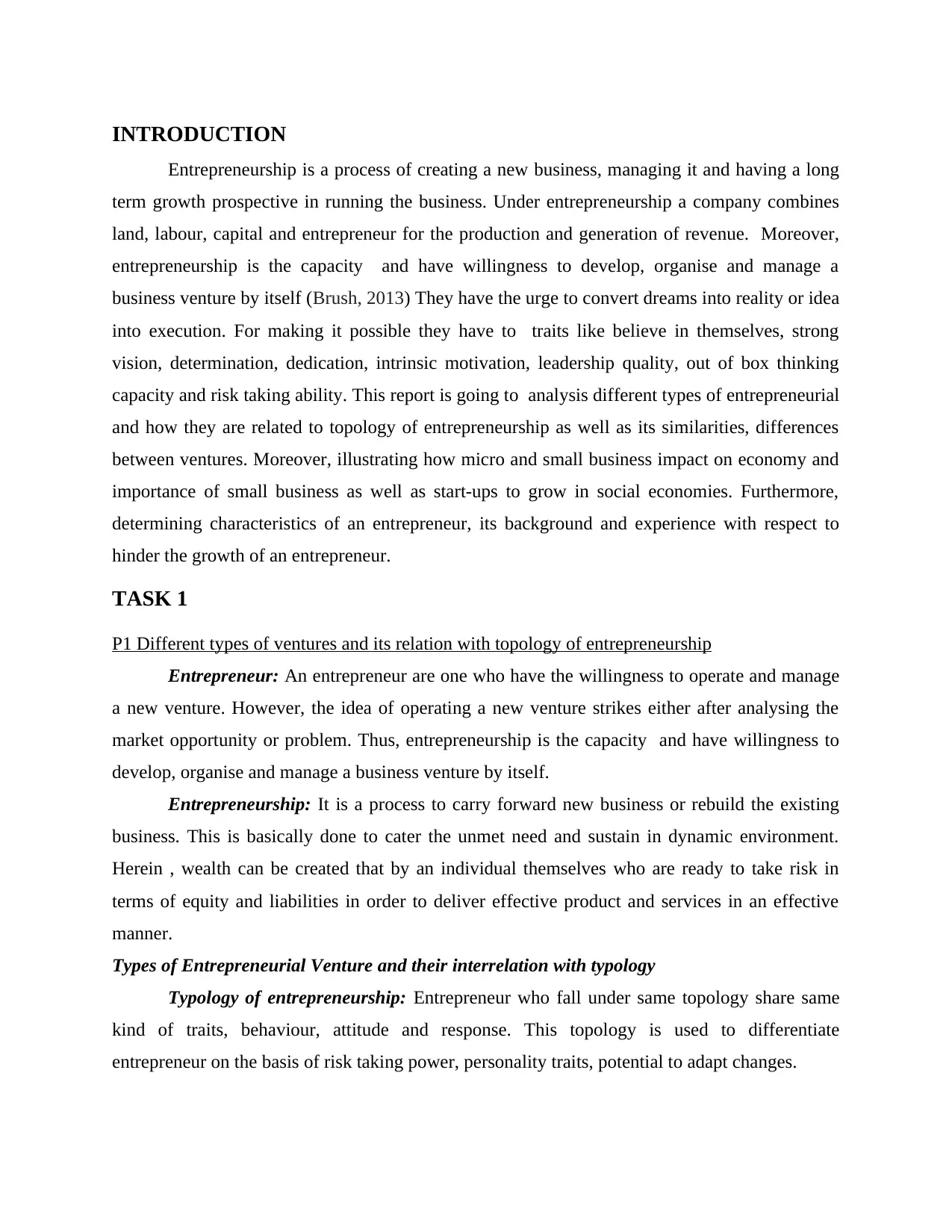
INTRODUCTION
Entrepreneurship is a process of creating a new business, managing it and having a long
term growth prospective in running the business. Under entrepreneurship a company combines
land, labour, capital and entrepreneur for the production and generation of revenue. Moreover,
entrepreneurship is the capacity and have willingness to develop, organise and manage a
business venture by itself (Brush, 2013) They have the urge to convert dreams into reality or idea
into execution. For making it possible they have to traits like believe in themselves, strong
vision, determination, dedication, intrinsic motivation, leadership quality, out of box thinking
capacity and risk taking ability. This report is going to analysis different types of entrepreneurial
and how they are related to topology of entrepreneurship as well as its similarities, differences
between ventures. Moreover, illustrating how micro and small business impact on economy and
importance of small business as well as start-ups to grow in social economies. Furthermore,
determining characteristics of an entrepreneur, its background and experience with respect to
hinder the growth of an entrepreneur.
TASK 1
P1 Different types of ventures and its relation with topology of entrepreneurship
Entrepreneur: An entrepreneur are one who have the willingness to operate and manage
a new venture. However, the idea of operating a new venture strikes either after analysing the
market opportunity or problem. Thus, entrepreneurship is the capacity and have willingness to
develop, organise and manage a business venture by itself.
Entrepreneurship: It is a process to carry forward new business or rebuild the existing
business. This is basically done to cater the unmet need and sustain in dynamic environment.
Herein , wealth can be created that by an individual themselves who are ready to take risk in
terms of equity and liabilities in order to deliver effective product and services in an effective
manner.
Types of Entrepreneurial Venture and their interrelation with typology
Typology of entrepreneurship: Entrepreneur who fall under same topology share same
kind of traits, behaviour, attitude and response. This topology is used to differentiate
entrepreneur on the basis of risk taking power, personality traits, potential to adapt changes.
Entrepreneurship is a process of creating a new business, managing it and having a long
term growth prospective in running the business. Under entrepreneurship a company combines
land, labour, capital and entrepreneur for the production and generation of revenue. Moreover,
entrepreneurship is the capacity and have willingness to develop, organise and manage a
business venture by itself (Brush, 2013) They have the urge to convert dreams into reality or idea
into execution. For making it possible they have to traits like believe in themselves, strong
vision, determination, dedication, intrinsic motivation, leadership quality, out of box thinking
capacity and risk taking ability. This report is going to analysis different types of entrepreneurial
and how they are related to topology of entrepreneurship as well as its similarities, differences
between ventures. Moreover, illustrating how micro and small business impact on economy and
importance of small business as well as start-ups to grow in social economies. Furthermore,
determining characteristics of an entrepreneur, its background and experience with respect to
hinder the growth of an entrepreneur.
TASK 1
P1 Different types of ventures and its relation with topology of entrepreneurship
Entrepreneur: An entrepreneur are one who have the willingness to operate and manage
a new venture. However, the idea of operating a new venture strikes either after analysing the
market opportunity or problem. Thus, entrepreneurship is the capacity and have willingness to
develop, organise and manage a business venture by itself.
Entrepreneurship: It is a process to carry forward new business or rebuild the existing
business. This is basically done to cater the unmet need and sustain in dynamic environment.
Herein , wealth can be created that by an individual themselves who are ready to take risk in
terms of equity and liabilities in order to deliver effective product and services in an effective
manner.
Types of Entrepreneurial Venture and their interrelation with typology
Typology of entrepreneurship: Entrepreneur who fall under same topology share same
kind of traits, behaviour, attitude and response. This topology is used to differentiate
entrepreneur on the basis of risk taking power, personality traits, potential to adapt changes.
⊘ This is a preview!⊘
Do you want full access?
Subscribe today to unlock all pages.

Trusted by 1+ million students worldwide
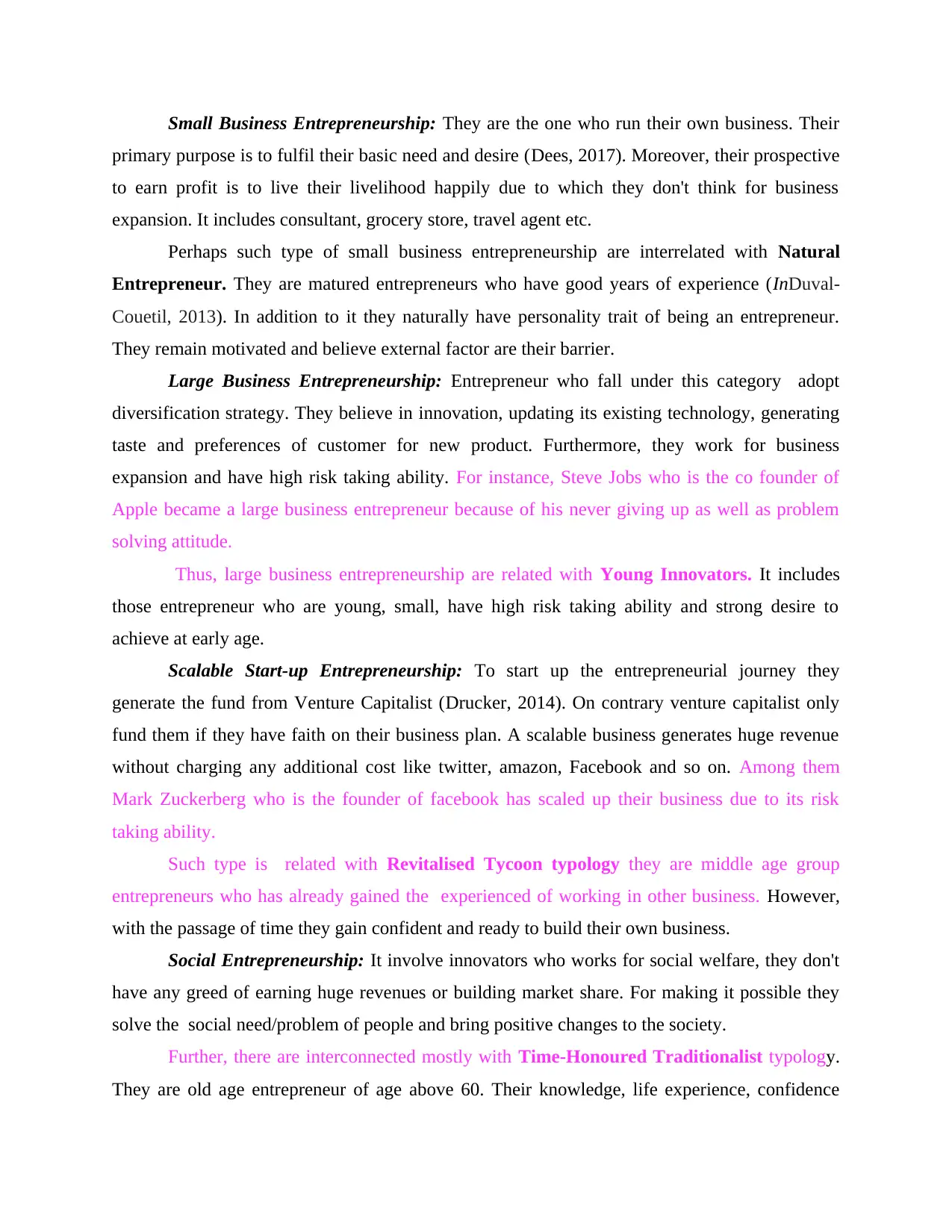
Small Business Entrepreneurship: They are the one who run their own business. Their
primary purpose is to fulfil their basic need and desire (Dees, 2017). Moreover, their prospective
to earn profit is to live their livelihood happily due to which they don't think for business
expansion. It includes consultant, grocery store, travel agent etc.
Perhaps such type of small business entrepreneurship are interrelated with Natural
Entrepreneur. They are matured entrepreneurs who have good years of experience (InDuval‐
Couetil, 2013). In addition to it they naturally have personality trait of being an entrepreneur.
They remain motivated and believe external factor are their barrier.
Large Business Entrepreneurship: Entrepreneur who fall under this category adopt
diversification strategy. They believe in innovation, updating its existing technology, generating
taste and preferences of customer for new product. Furthermore, they work for business
expansion and have high risk taking ability. For instance, Steve Jobs who is the co founder of
Apple became a large business entrepreneur because of his never giving up as well as problem
solving attitude.
Thus, large business entrepreneurship are related with Young Innovators. It includes
those entrepreneur who are young, small, have high risk taking ability and strong desire to
achieve at early age.
Scalable Start-up Entrepreneurship: To start up the entrepreneurial journey they
generate the fund from Venture Capitalist (Drucker, 2014). On contrary venture capitalist only
fund them if they have faith on their business plan. A scalable business generates huge revenue
without charging any additional cost like twitter, amazon, Facebook and so on. Among them
Mark Zuckerberg who is the founder of facebook has scaled up their business due to its risk
taking ability.
Such type is related with Revitalised Tycoon typology they are middle age group
entrepreneurs who has already gained the experienced of working in other business. However,
with the passage of time they gain confident and ready to build their own business.
Social Entrepreneurship: It involve innovators who works for social welfare, they don't
have any greed of earning huge revenues or building market share. For making it possible they
solve the social need/problem of people and bring positive changes to the society.
Further, there are interconnected mostly with Time-Honoured Traditionalist typology.
They are old age entrepreneur of age above 60. Their knowledge, life experience, confidence
primary purpose is to fulfil their basic need and desire (Dees, 2017). Moreover, their prospective
to earn profit is to live their livelihood happily due to which they don't think for business
expansion. It includes consultant, grocery store, travel agent etc.
Perhaps such type of small business entrepreneurship are interrelated with Natural
Entrepreneur. They are matured entrepreneurs who have good years of experience (InDuval‐
Couetil, 2013). In addition to it they naturally have personality trait of being an entrepreneur.
They remain motivated and believe external factor are their barrier.
Large Business Entrepreneurship: Entrepreneur who fall under this category adopt
diversification strategy. They believe in innovation, updating its existing technology, generating
taste and preferences of customer for new product. Furthermore, they work for business
expansion and have high risk taking ability. For instance, Steve Jobs who is the co founder of
Apple became a large business entrepreneur because of his never giving up as well as problem
solving attitude.
Thus, large business entrepreneurship are related with Young Innovators. It includes
those entrepreneur who are young, small, have high risk taking ability and strong desire to
achieve at early age.
Scalable Start-up Entrepreneurship: To start up the entrepreneurial journey they
generate the fund from Venture Capitalist (Drucker, 2014). On contrary venture capitalist only
fund them if they have faith on their business plan. A scalable business generates huge revenue
without charging any additional cost like twitter, amazon, Facebook and so on. Among them
Mark Zuckerberg who is the founder of facebook has scaled up their business due to its risk
taking ability.
Such type is related with Revitalised Tycoon typology they are middle age group
entrepreneurs who has already gained the experienced of working in other business. However,
with the passage of time they gain confident and ready to build their own business.
Social Entrepreneurship: It involve innovators who works for social welfare, they don't
have any greed of earning huge revenues or building market share. For making it possible they
solve the social need/problem of people and bring positive changes to the society.
Further, there are interconnected mostly with Time-Honoured Traditionalist typology.
They are old age entrepreneur of age above 60. Their knowledge, life experience, confidence
Paraphrase This Document
Need a fresh take? Get an instant paraphrase of this document with our AI Paraphraser
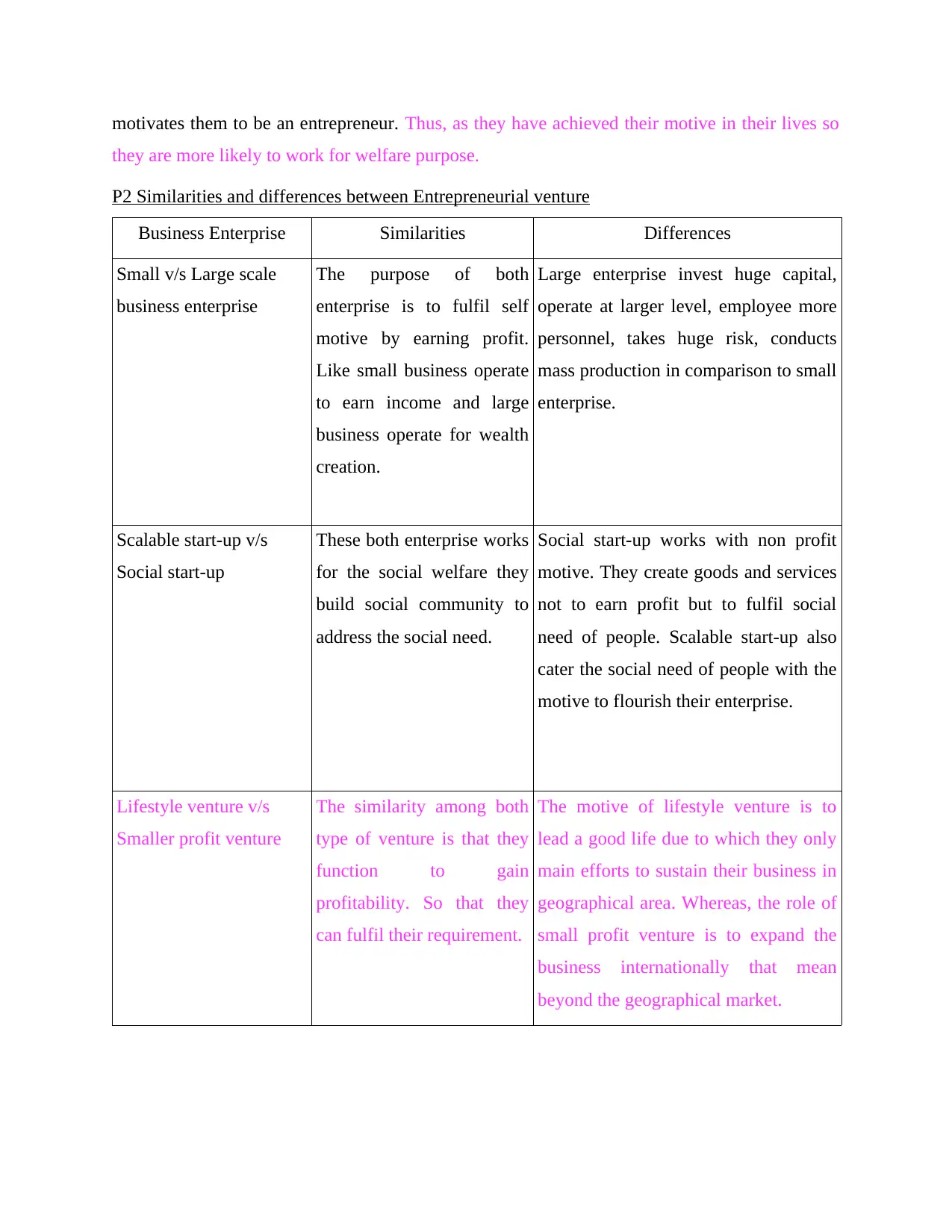
motivates them to be an entrepreneur. Thus, as they have achieved their motive in their lives so
they are more likely to work for welfare purpose.
P2 Similarities and differences between Entrepreneurial venture
Business Enterprise Similarities Differences
Small v/s Large scale
business enterprise
The purpose of both
enterprise is to fulfil self
motive by earning profit.
Like small business operate
to earn income and large
business operate for wealth
creation.
Large enterprise invest huge capital,
operate at larger level, employee more
personnel, takes huge risk, conducts
mass production in comparison to small
enterprise.
Scalable start-up v/s
Social start-up
These both enterprise works
for the social welfare they
build social community to
address the social need.
Social start-up works with non profit
motive. They create goods and services
not to earn profit but to fulfil social
need of people. Scalable start-up also
cater the social need of people with the
motive to flourish their enterprise.
Lifestyle venture v/s
Smaller profit venture
The similarity among both
type of venture is that they
function to gain
profitability. So that they
can fulfil their requirement.
The motive of lifestyle venture is to
lead a good life due to which they only
main efforts to sustain their business in
geographical area. Whereas, the role of
small profit venture is to expand the
business internationally that mean
beyond the geographical market.
they are more likely to work for welfare purpose.
P2 Similarities and differences between Entrepreneurial venture
Business Enterprise Similarities Differences
Small v/s Large scale
business enterprise
The purpose of both
enterprise is to fulfil self
motive by earning profit.
Like small business operate
to earn income and large
business operate for wealth
creation.
Large enterprise invest huge capital,
operate at larger level, employee more
personnel, takes huge risk, conducts
mass production in comparison to small
enterprise.
Scalable start-up v/s
Social start-up
These both enterprise works
for the social welfare they
build social community to
address the social need.
Social start-up works with non profit
motive. They create goods and services
not to earn profit but to fulfil social
need of people. Scalable start-up also
cater the social need of people with the
motive to flourish their enterprise.
Lifestyle venture v/s
Smaller profit venture
The similarity among both
type of venture is that they
function to gain
profitability. So that they
can fulfil their requirement.
The motive of lifestyle venture is to
lead a good life due to which they only
main efforts to sustain their business in
geographical area. Whereas, the role of
small profit venture is to expand the
business internationally that mean
beyond the geographical market.
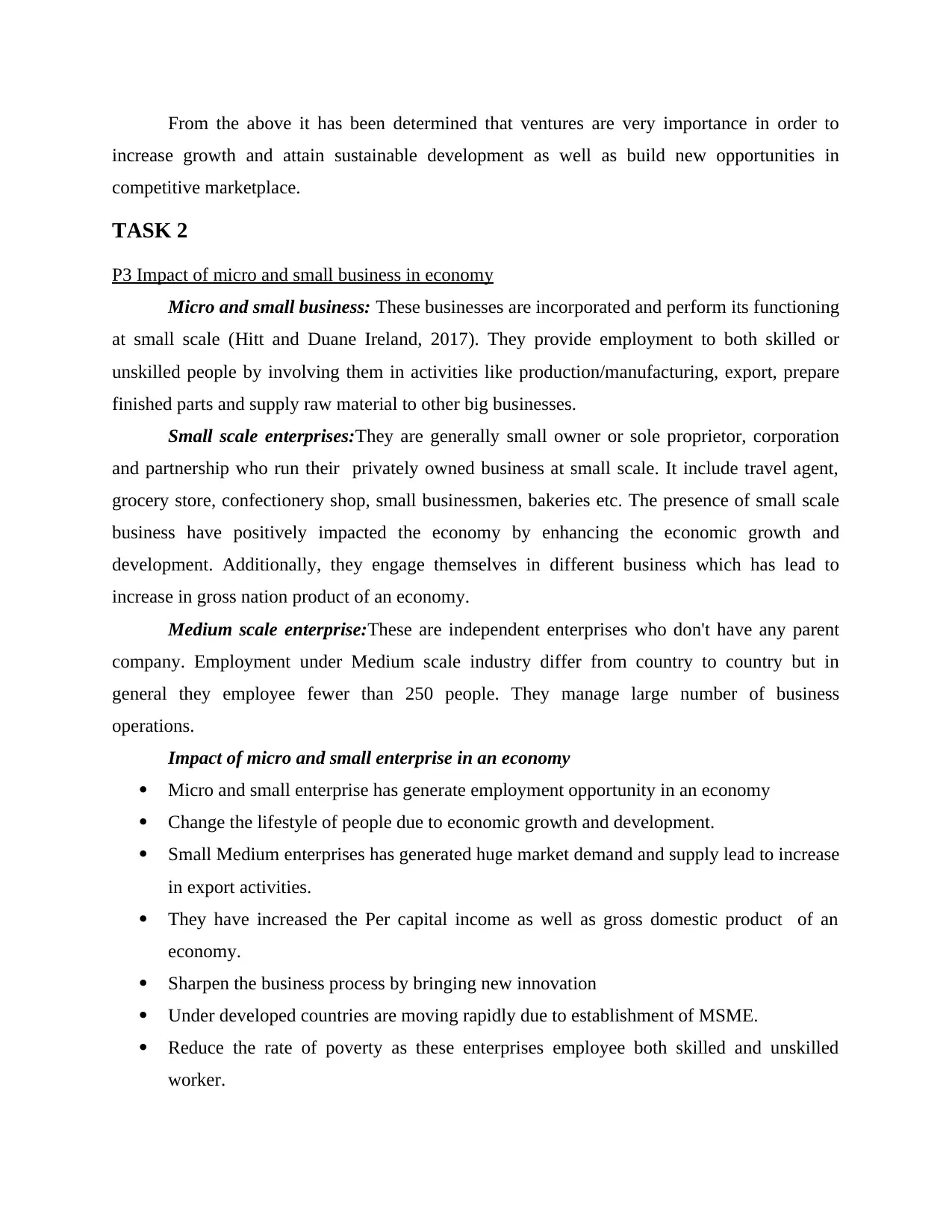
From the above it has been determined that ventures are very importance in order to
increase growth and attain sustainable development as well as build new opportunities in
competitive marketplace.
TASK 2
P3 Impact of micro and small business in economy
Micro and small business: These businesses are incorporated and perform its functioning
at small scale (Hitt and Duane Ireland, 2017). They provide employment to both skilled or
unskilled people by involving them in activities like production/manufacturing, export, prepare
finished parts and supply raw material to other big businesses.
Small scale enterprises:They are generally small owner or sole proprietor, corporation
and partnership who run their privately owned business at small scale. It include travel agent,
grocery store, confectionery shop, small businessmen, bakeries etc. The presence of small scale
business have positively impacted the economy by enhancing the economic growth and
development. Additionally, they engage themselves in different business which has lead to
increase in gross nation product of an economy.
Medium scale enterprise:These are independent enterprises who don't have any parent
company. Employment under Medium scale industry differ from country to country but in
general they employee fewer than 250 people. They manage large number of business
operations.
Impact of micro and small enterprise in an economy
Micro and small enterprise has generate employment opportunity in an economy
Change the lifestyle of people due to economic growth and development.
Small Medium enterprises has generated huge market demand and supply lead to increase
in export activities.
They have increased the Per capital income as well as gross domestic product of an
economy.
Sharpen the business process by bringing new innovation
Under developed countries are moving rapidly due to establishment of MSME.
Reduce the rate of poverty as these enterprises employee both skilled and unskilled
worker.
increase growth and attain sustainable development as well as build new opportunities in
competitive marketplace.
TASK 2
P3 Impact of micro and small business in economy
Micro and small business: These businesses are incorporated and perform its functioning
at small scale (Hitt and Duane Ireland, 2017). They provide employment to both skilled or
unskilled people by involving them in activities like production/manufacturing, export, prepare
finished parts and supply raw material to other big businesses.
Small scale enterprises:They are generally small owner or sole proprietor, corporation
and partnership who run their privately owned business at small scale. It include travel agent,
grocery store, confectionery shop, small businessmen, bakeries etc. The presence of small scale
business have positively impacted the economy by enhancing the economic growth and
development. Additionally, they engage themselves in different business which has lead to
increase in gross nation product of an economy.
Medium scale enterprise:These are independent enterprises who don't have any parent
company. Employment under Medium scale industry differ from country to country but in
general they employee fewer than 250 people. They manage large number of business
operations.
Impact of micro and small enterprise in an economy
Micro and small enterprise has generate employment opportunity in an economy
Change the lifestyle of people due to economic growth and development.
Small Medium enterprises has generated huge market demand and supply lead to increase
in export activities.
They have increased the Per capital income as well as gross domestic product of an
economy.
Sharpen the business process by bringing new innovation
Under developed countries are moving rapidly due to establishment of MSME.
Reduce the rate of poverty as these enterprises employee both skilled and unskilled
worker.
⊘ This is a preview!⊘
Do you want full access?
Subscribe today to unlock all pages.

Trusted by 1+ million students worldwide
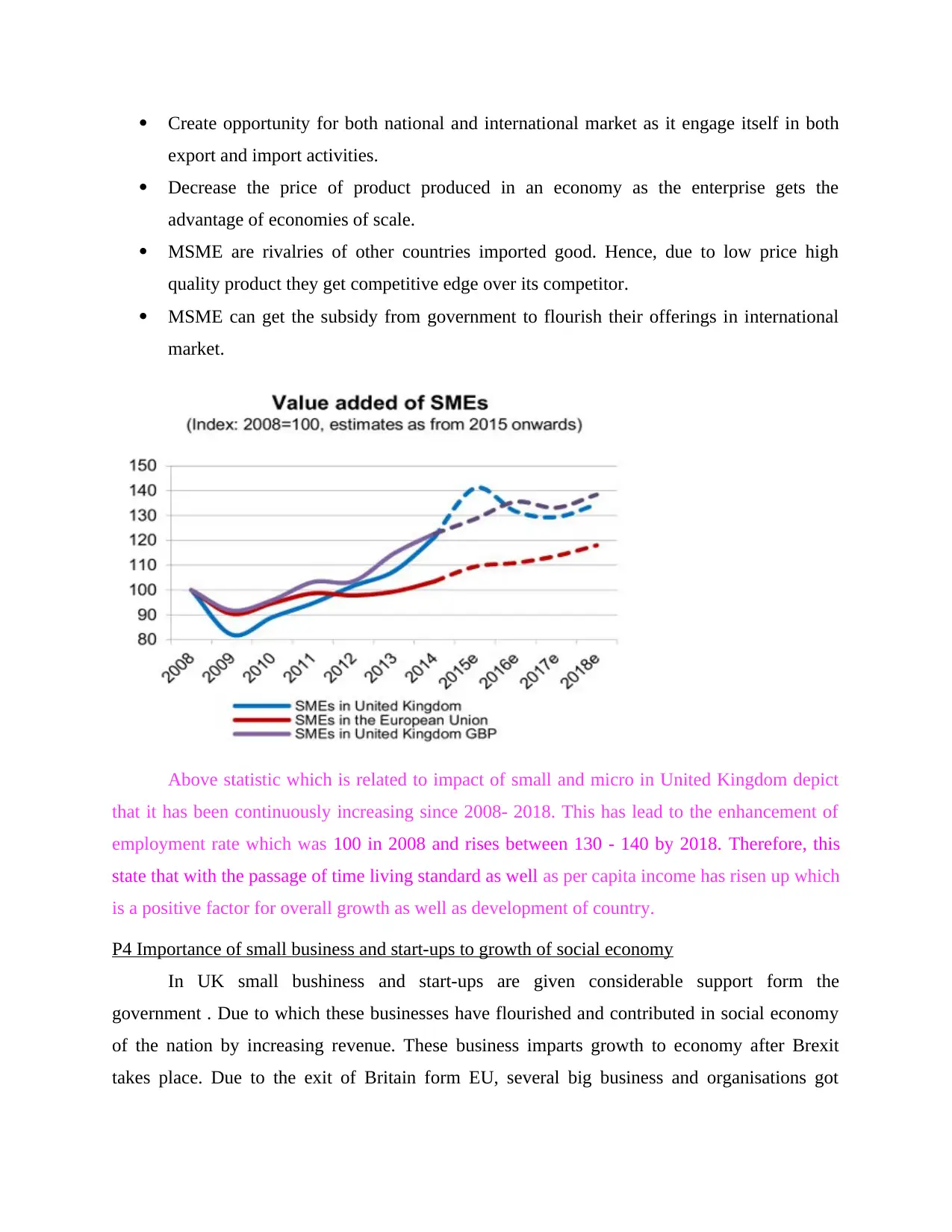
Create opportunity for both national and international market as it engage itself in both
export and import activities.
Decrease the price of product produced in an economy as the enterprise gets the
advantage of economies of scale.
MSME are rivalries of other countries imported good. Hence, due to low price high
quality product they get competitive edge over its competitor.
MSME can get the subsidy from government to flourish their offerings in international
market.
Above statistic which is related to impact of small and micro in United Kingdom depict
that it has been continuously increasing since 2008- 2018. This has lead to the enhancement of
employment rate which was 100 in 2008 and rises between 130 - 140 by 2018. Therefore, this
state that with the passage of time living standard as well as per capita income has risen up which
is a positive factor for overall growth as well as development of country.
P4 Importance of small business and start-ups to growth of social economy
In UK small bushiness and start-ups are given considerable support form the
government . Due to which these businesses have flourished and contributed in social economy
of the nation by increasing revenue. These business imparts growth to economy after Brexit
takes place. Due to the exit of Britain form EU, several big business and organisations got
export and import activities.
Decrease the price of product produced in an economy as the enterprise gets the
advantage of economies of scale.
MSME are rivalries of other countries imported good. Hence, due to low price high
quality product they get competitive edge over its competitor.
MSME can get the subsidy from government to flourish their offerings in international
market.
Above statistic which is related to impact of small and micro in United Kingdom depict
that it has been continuously increasing since 2008- 2018. This has lead to the enhancement of
employment rate which was 100 in 2008 and rises between 130 - 140 by 2018. Therefore, this
state that with the passage of time living standard as well as per capita income has risen up which
is a positive factor for overall growth as well as development of country.
P4 Importance of small business and start-ups to growth of social economy
In UK small bushiness and start-ups are given considerable support form the
government . Due to which these businesses have flourished and contributed in social economy
of the nation by increasing revenue. These business imparts growth to economy after Brexit
takes place. Due to the exit of Britain form EU, several big business and organisations got
Paraphrase This Document
Need a fresh take? Get an instant paraphrase of this document with our AI Paraphraser
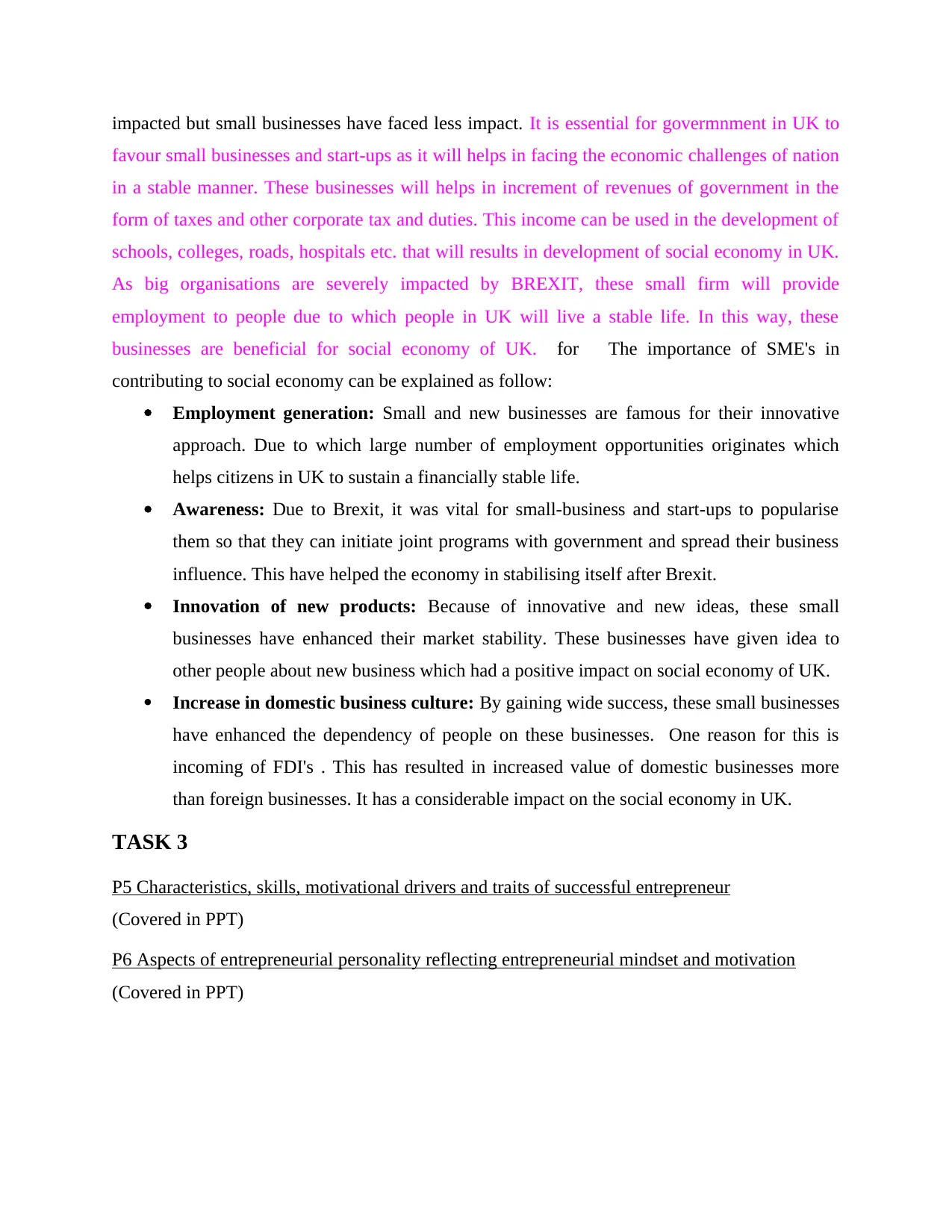
impacted but small businesses have faced less impact. It is essential for govermnment in UK to
favour small businesses and start-ups as it will helps in facing the economic challenges of nation
in a stable manner. These businesses will helps in increment of revenues of government in the
form of taxes and other corporate tax and duties. This income can be used in the development of
schools, colleges, roads, hospitals etc. that will results in development of social economy in UK.
As big organisations are severely impacted by BREXIT, these small firm will provide
employment to people due to which people in UK will live a stable life. In this way, these
businesses are beneficial for social economy of UK. for The importance of SME's in
contributing to social economy can be explained as follow:
Employment generation: Small and new businesses are famous for their innovative
approach. Due to which large number of employment opportunities originates which
helps citizens in UK to sustain a financially stable life.
Awareness: Due to Brexit, it was vital for small-business and start-ups to popularise
them so that they can initiate joint programs with government and spread their business
influence. This have helped the economy in stabilising itself after Brexit.
Innovation of new products: Because of innovative and new ideas, these small
businesses have enhanced their market stability. These businesses have given idea to
other people about new business which had a positive impact on social economy of UK.
Increase in domestic business culture: By gaining wide success, these small businesses
have enhanced the dependency of people on these businesses. One reason for this is
incoming of FDI's . This has resulted in increased value of domestic businesses more
than foreign businesses. It has a considerable impact on the social economy in UK.
TASK 3
P5 Characteristics, skills, motivational drivers and traits of successful entrepreneur
(Covered in PPT)
P6 Aspects of entrepreneurial personality reflecting entrepreneurial mindset and motivation
(Covered in PPT)
favour small businesses and start-ups as it will helps in facing the economic challenges of nation
in a stable manner. These businesses will helps in increment of revenues of government in the
form of taxes and other corporate tax and duties. This income can be used in the development of
schools, colleges, roads, hospitals etc. that will results in development of social economy in UK.
As big organisations are severely impacted by BREXIT, these small firm will provide
employment to people due to which people in UK will live a stable life. In this way, these
businesses are beneficial for social economy of UK. for The importance of SME's in
contributing to social economy can be explained as follow:
Employment generation: Small and new businesses are famous for their innovative
approach. Due to which large number of employment opportunities originates which
helps citizens in UK to sustain a financially stable life.
Awareness: Due to Brexit, it was vital for small-business and start-ups to popularise
them so that they can initiate joint programs with government and spread their business
influence. This have helped the economy in stabilising itself after Brexit.
Innovation of new products: Because of innovative and new ideas, these small
businesses have enhanced their market stability. These businesses have given idea to
other people about new business which had a positive impact on social economy of UK.
Increase in domestic business culture: By gaining wide success, these small businesses
have enhanced the dependency of people on these businesses. One reason for this is
incoming of FDI's . This has resulted in increased value of domestic businesses more
than foreign businesses. It has a considerable impact on the social economy in UK.
TASK 3
P5 Characteristics, skills, motivational drivers and traits of successful entrepreneur
(Covered in PPT)
P6 Aspects of entrepreneurial personality reflecting entrepreneurial mindset and motivation
(Covered in PPT)
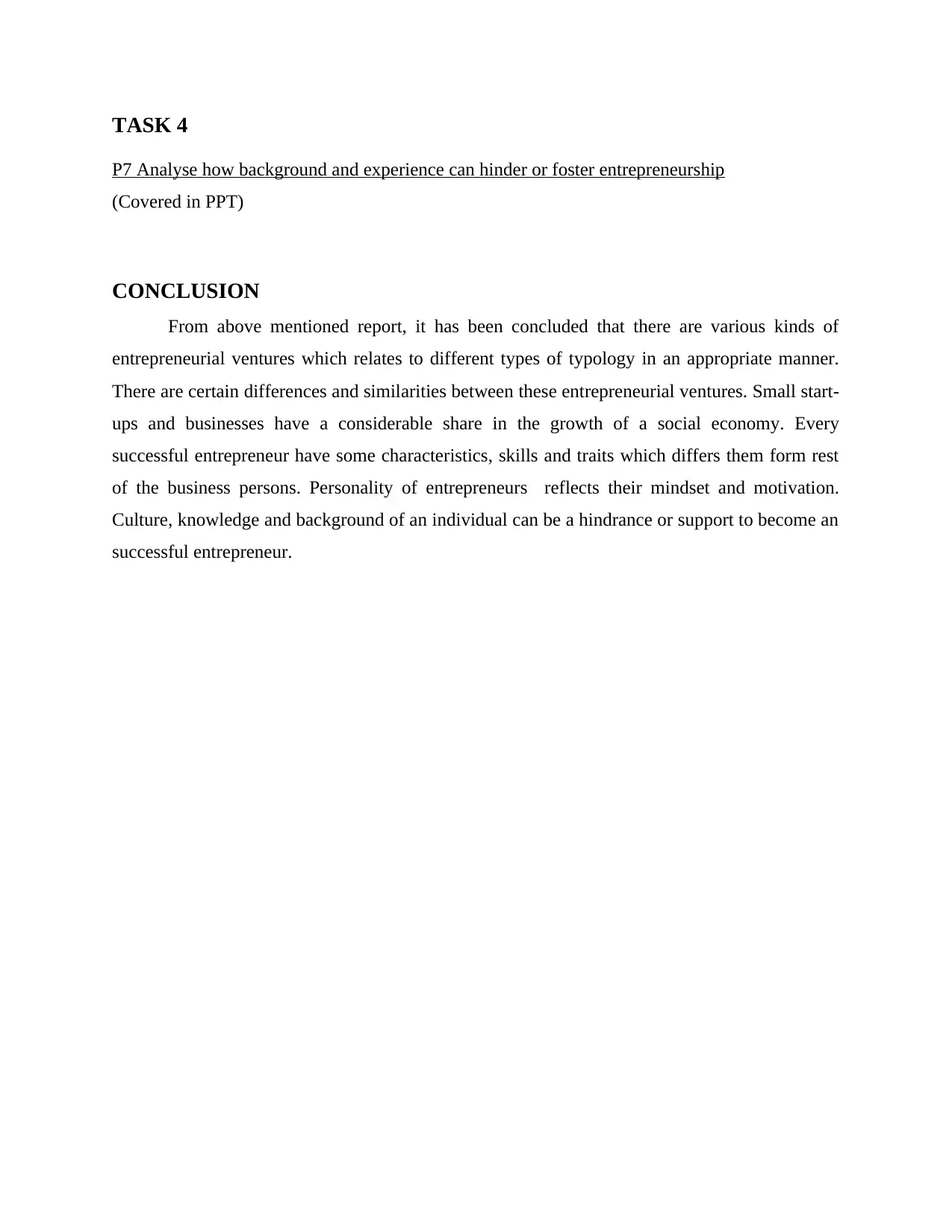
TASK 4
P7 Analyse how background and experience can hinder or foster entrepreneurship
(Covered in PPT)
CONCLUSION
From above mentioned report, it has been concluded that there are various kinds of
entrepreneurial ventures which relates to different types of typology in an appropriate manner.
There are certain differences and similarities between these entrepreneurial ventures. Small start-
ups and businesses have a considerable share in the growth of a social economy. Every
successful entrepreneur have some characteristics, skills and traits which differs them form rest
of the business persons. Personality of entrepreneurs reflects their mindset and motivation.
Culture, knowledge and background of an individual can be a hindrance or support to become an
successful entrepreneur.
P7 Analyse how background and experience can hinder or foster entrepreneurship
(Covered in PPT)
CONCLUSION
From above mentioned report, it has been concluded that there are various kinds of
entrepreneurial ventures which relates to different types of typology in an appropriate manner.
There are certain differences and similarities between these entrepreneurial ventures. Small start-
ups and businesses have a considerable share in the growth of a social economy. Every
successful entrepreneur have some characteristics, skills and traits which differs them form rest
of the business persons. Personality of entrepreneurs reflects their mindset and motivation.
Culture, knowledge and background of an individual can be a hindrance or support to become an
successful entrepreneur.
⊘ This is a preview!⊘
Do you want full access?
Subscribe today to unlock all pages.

Trusted by 1+ million students worldwide
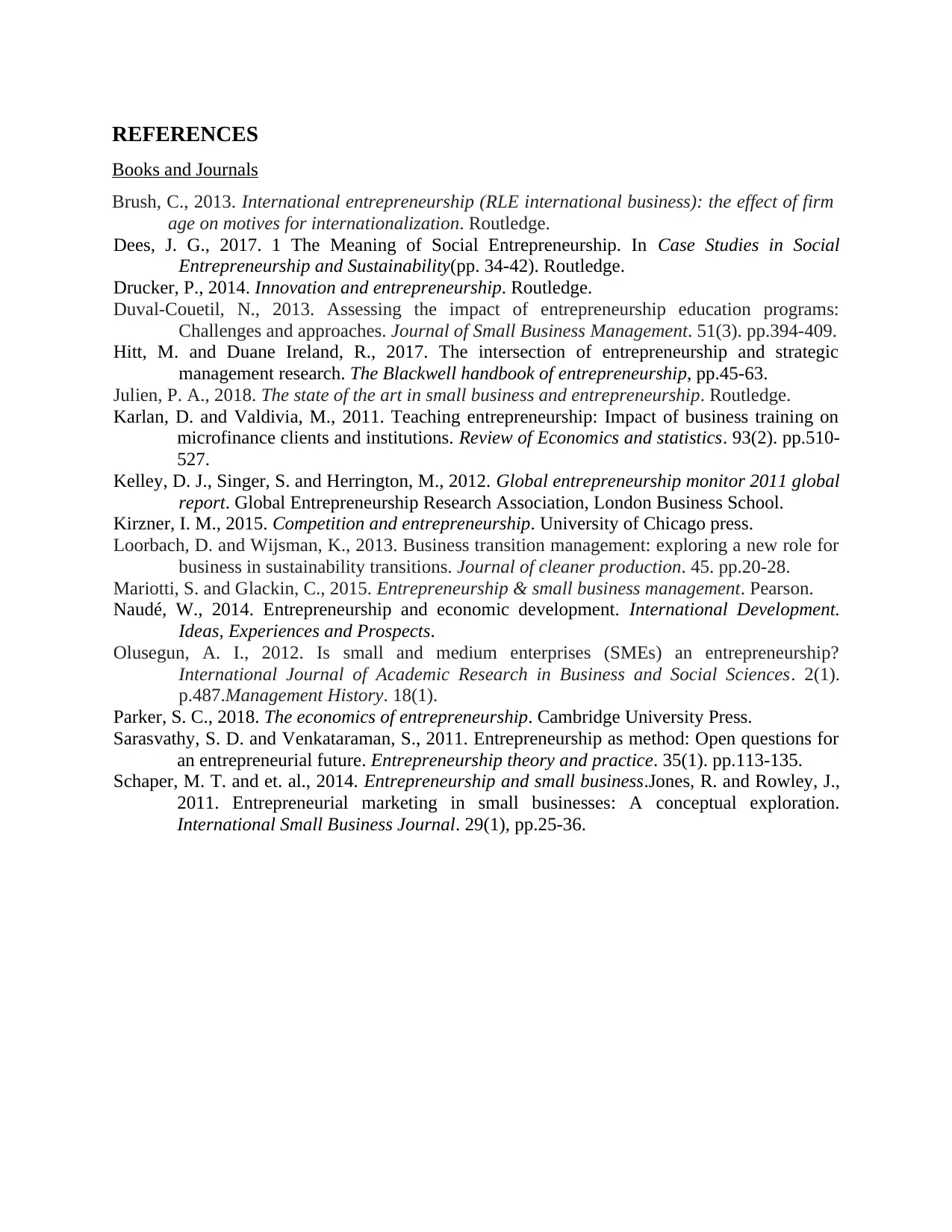
REFERENCES
Books and Journals
Brush, C., 2013. International entrepreneurship (RLE international business): the effect of firm
age on motives for internationalization. Routledge.
Dees, J. G., 2017. 1 The Meaning of Social Entrepreneurship. In Case Studies in Social
Entrepreneurship and Sustainability(pp. 34-42). Routledge.
Drucker, P., 2014. Innovation and entrepreneurship. Routledge.
Duval‐Couetil, N., 2013. Assessing the impact of entrepreneurship education programs:
Challenges and approaches. Journal of Small Business Management. 51(3). pp.394-409.
Hitt, M. and Duane Ireland, R., 2017. The intersection of entrepreneurship and strategic
management research. The Blackwell handbook of entrepreneurship, pp.45-63.
Julien, P. A., 2018. The state of the art in small business and entrepreneurship. Routledge.
Karlan, D. and Valdivia, M., 2011. Teaching entrepreneurship: Impact of business training on
microfinance clients and institutions. Review of Economics and statistics. 93(2). pp.510-
527.
Kelley, D. J., Singer, S. and Herrington, M., 2012. Global entrepreneurship monitor 2011 global
report. Global Entrepreneurship Research Association, London Business School.
Kirzner, I. M., 2015. Competition and entrepreneurship. University of Chicago press.
Loorbach, D. and Wijsman, K., 2013. Business transition management: exploring a new role for
business in sustainability transitions. Journal of cleaner production. 45. pp.20-28.
Mariotti, S. and Glackin, C., 2015. Entrepreneurship & small business management. Pearson.
Naudé, W., 2014. Entrepreneurship and economic development. International Development.
Ideas, Experiences and Prospects.
Olusegun, A. I., 2012. Is small and medium enterprises (SMEs) an entrepreneurship?
International Journal of Academic Research in Business and Social Sciences. 2(1).
p.487.Management History. 18(1).
Parker, S. C., 2018. The economics of entrepreneurship. Cambridge University Press.
Sarasvathy, S. D. and Venkataraman, S., 2011. Entrepreneurship as method: Open questions for
an entrepreneurial future. Entrepreneurship theory and practice. 35(1). pp.113-135.
Schaper, M. T. and et. al., 2014. Entrepreneurship and small business.Jones, R. and Rowley, J.,
2011. Entrepreneurial marketing in small businesses: A conceptual exploration.
International Small Business Journal. 29(1), pp.25-36.
Books and Journals
Brush, C., 2013. International entrepreneurship (RLE international business): the effect of firm
age on motives for internationalization. Routledge.
Dees, J. G., 2017. 1 The Meaning of Social Entrepreneurship. In Case Studies in Social
Entrepreneurship and Sustainability(pp. 34-42). Routledge.
Drucker, P., 2014. Innovation and entrepreneurship. Routledge.
Duval‐Couetil, N., 2013. Assessing the impact of entrepreneurship education programs:
Challenges and approaches. Journal of Small Business Management. 51(3). pp.394-409.
Hitt, M. and Duane Ireland, R., 2017. The intersection of entrepreneurship and strategic
management research. The Blackwell handbook of entrepreneurship, pp.45-63.
Julien, P. A., 2018. The state of the art in small business and entrepreneurship. Routledge.
Karlan, D. and Valdivia, M., 2011. Teaching entrepreneurship: Impact of business training on
microfinance clients and institutions. Review of Economics and statistics. 93(2). pp.510-
527.
Kelley, D. J., Singer, S. and Herrington, M., 2012. Global entrepreneurship monitor 2011 global
report. Global Entrepreneurship Research Association, London Business School.
Kirzner, I. M., 2015. Competition and entrepreneurship. University of Chicago press.
Loorbach, D. and Wijsman, K., 2013. Business transition management: exploring a new role for
business in sustainability transitions. Journal of cleaner production. 45. pp.20-28.
Mariotti, S. and Glackin, C., 2015. Entrepreneurship & small business management. Pearson.
Naudé, W., 2014. Entrepreneurship and economic development. International Development.
Ideas, Experiences and Prospects.
Olusegun, A. I., 2012. Is small and medium enterprises (SMEs) an entrepreneurship?
International Journal of Academic Research in Business and Social Sciences. 2(1).
p.487.Management History. 18(1).
Parker, S. C., 2018. The economics of entrepreneurship. Cambridge University Press.
Sarasvathy, S. D. and Venkataraman, S., 2011. Entrepreneurship as method: Open questions for
an entrepreneurial future. Entrepreneurship theory and practice. 35(1). pp.113-135.
Schaper, M. T. and et. al., 2014. Entrepreneurship and small business.Jones, R. and Rowley, J.,
2011. Entrepreneurial marketing in small businesses: A conceptual exploration.
International Small Business Journal. 29(1), pp.25-36.
1 out of 10
Related Documents
Your All-in-One AI-Powered Toolkit for Academic Success.
+13062052269
info@desklib.com
Available 24*7 on WhatsApp / Email
![[object Object]](/_next/static/media/star-bottom.7253800d.svg)
Unlock your academic potential
Copyright © 2020–2026 A2Z Services. All Rights Reserved. Developed and managed by ZUCOL.




